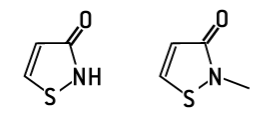Enhanced TDS
Knowde-enriched technical product data sheet
Identification & Functionality
- Chemical Family
- Chemical Name
- CASE Ingredients Functions
- Cleaning Ingredients Functions
- Technologies
- Product Families
- Chemical Structure

- Composition
An aqueous solution of 1,2-benzisothiazolin-3-one (BIT) and 2-methyl-4-isothiazolin-3-one (MIT)
Features & Benefits
Applications & Uses
- Markets
- Applications
- Home Care Applications
- Applications
The product is effective in polymer emulsions, paints, adhesives, pigment dispersions and household products.
- Amount to Use
The concentration required to adequately preserve your product depends on several factors. These include the susceptibility of the system to microbiological degradation, the extent to which microorganisms can gain access, the species involved, pH, temperature, and length of time for which protection is required.
Results of initial studies indicate that a concentration of PROXEL™ MB4 Preservative in the range 0.1-0.3% should be sufficient for most applications. Since the effective concentration can be dependent on several factors it is recommended that a testing program can be undertaken to determine the most cost-effective dose for your application.
Testing should take into account chemical compatibility/stability, plant hygiene conditions, susceptibility of the product to contamination, and the typical organisms involved.
Properties
- Physical Form
- Typical Physical Properties
Value Units Test Method / Conditions pH Value (25°C) 8.0 - 9.5 - - Boiling Point 100 °C Flash Point Boils without flashing Density (at 25°C) 1.02 - 1.03 g/ml - Minimum Inhibitory Concentrations (MIC)
Table 1.
Micro-organism MIC (ppm) Bacteria Alcaligenes faecalis IMI 358536 15 Bacillus subtilis NCTC 10400 40 Burkholderia cepacia NCIMB 13694 190 Enterobacter cloacae CIP 104674 470 Escherichia coli IMI 362054 220 Proteus vulgaris IMI 358534 110 Pseudomonas aeruginosa IMI 358539 435 Pseudomonas putida IMI 358533 310 Pseudomonas stutzeri NCIMB 11359 55 Staphylococcus aureus NCIMB 9518 80 Fungi Aureobasidium pullulans PRA FS/1 220 Cladosporium herbarum PRA FS/5 150 Yeasts Rhodotorula rubra NCTC 9449 440 Saccharomyces cerevisiae NCYC 87 875 - Preservative Properties
This product is effective against a range of problem microorganisms some of which are listed in Table 1. Please note that Minimum Inhibitory Concentrations (MIC) do not represent effective in-use concentrations which should be discussed with your local Lonza representative.
PROXEL™ MB4 Preservative has a non-specific mode of action which means
that bacterial resistance is very unlikely to occur.- Compatibility
Avoid strong alkaline conditions, oxidizing agents, reducing agents, amimes and mercaptans
Regulatory & Compliance
- Certifications & Compliance
- Chemical Inventories
- Total Quality
Lonza holds a number of ISO 9001 Quality Management registrations covering our product range. The scope of each registration is specific to the location or entity named on the Registration Certificate and our products are supplied to ISO 9001 Standards.
- Regulatory Information
The components of PROXEL™ MB4 Preservative are in compliance with the following inventories:
- EINECS (Europe)
- TSCA (USA)
- AICS (Australia)
- ENCS (Japan)
- DSL (Canada)
- KECL (Korea)
- PICCS (Philippines)
- IECSC (China)
Safety & Health
- Risk Assessment and Management
Lonza professionals have a wide expertise in the fields of Safety, Health and the Environment. Lonza Microbial Control is committed to and uses this expertise in understanding the suitability of PROXEL™ MB4 Preservative for specific applications
- Health and Safety
The PROXEL™ MB4 Preservative Safety Data Sheet may be supplied upon request. It should be read and understood by all supervisory personnel and employees before using this product
Packaging & Availability
- Country Availability
- Regional Availability
Storage & Handling
- Storage & Stability
Stable under normal conditions of storage down to 0°C. If frozen, allow to thaw and stir well before use.